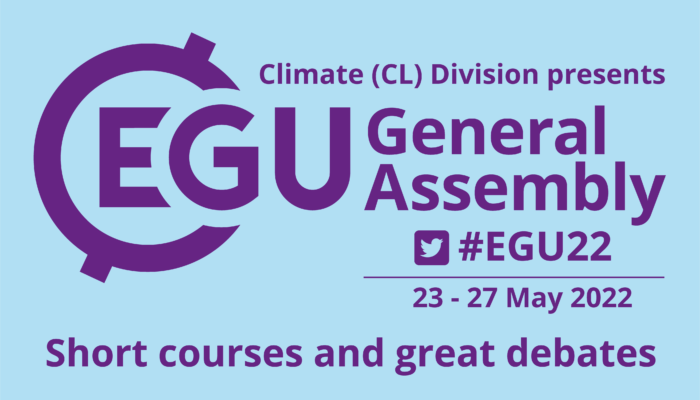
Dear climate enthusiasts, EGU lovers, and early/senior climate scientists,
With #EGU22 approaching, we wanted to give you a quick overview of the great short courses and great debates that are planned for this years’ General Assembly! If you want to learn more about the scientific sessions offered, please have a look at our Seasonal love letter from December.
Short Courses
If you are about to finish your Ph.D. and are not sure where the road ahead leads, don’t miss out on the Careers inside and outside of academia: Panel Discussion by Francesco Giuntoli and co-conveners. In this panel discussion, scientists with a range of backgrounds give their advice on where to find jobs, how to transition between academia and industry, and what are the pros and cons of a career inside and outside of academia. There is ample opportunity to ask questions as well.
Meet editors of internationally renowned journals in geo- and biogeoscience and gain exclusive insights into the publishing process in the short course How to Publish and Review in Bio- and Geoscience: Ask the Editors organized by Marcus Schiedung and co-conveners. There will be an open discussion on the key steps and other factors during the publication process.
Can’t get enough of climate science in the ongoing scientific and political debate? Learn all the necessities for your next discussion in Unpacking the IPCC AR6 Report organized by TJ Young and Sophie Berger. This short course will be a panel discussion where authors and contributors of Working Group I unpack the most relevant findings of the IPCC 6th Assessment Report (AR6), provide personal behind-the-scenes insight on its development, and discuss its global impact.
Tommaso Alberti and co-conveners present Nonlinear Processes in Geosciences: from past methods to novel approaches. This short course offers a broad overview of the development and application of nonlinear concepts across the geosciences in terms of recent successful applications from various fields, ranging from climate to near-Earth space physics. The focus will be on a comparison between different methods to investigate various aspects of both known and unknown physical processes, moving from past accomplishments to future challenges.
Want to polish your thermodynamic skills? Get all the essentials of equilibrium and non-equilibrium thermodynamics, irreversible processes, and energetics of multicomponent stratified fluids in the short course Thermodynamics and energetics of the oceans, atmosphere, and climate by Valerio Lembo et al. The course will provide an advanced introduction and will illustrate some applications.
The short course Scales and Scaling in the Climate System organized by Shaun Lovejoy and co-conveners looks into climate variations recorded in time series or spatial distributions. Instead of treating this variability as a limitation, it is treated as an important, fundamental aspect of the climate dynamics that must be understood and modeled in its own right.
If you work with geochronological data, don’t miss out on the short course by Aayush Srivastava and co-conveners about the Application of age models in paleoclimatology and geomorphology. The Short Course will provide an overview of age models and the problems one encounters in climate science and geomorphology. Case studies and practical examples are given to present solutions for these challenges. It will prepare the participants from CL, GM, and other divisions for independent application of suitable age-depth models to their climate or geomorphologic data.
In Introduction to time series analysis for Earth scientists by Matthias Sinnesael and co-conveners you can learn all about cyclicities in paleoclimate data (e.g., sediments, speleothems) or any other geological record. The basics are reviewed of which data can be analyzed, power spectra and the application of filters and Wavelet Analysis are discussed. The aim of this course is to give a brief overview of the most common techniques and give participants the insight to prepare and analyze their data themselves.
Finally, Earth System Model Evaluation with ESMValTool in the Jupyter notebook by Bouwe Andela et al. might be of interest for everyone working with climate data. the ESMValTool is presented, which is a Python project developed to facilitate the analysis of climate data through so-called recipes. In this course, we will run some of the available example recipes using ESMValTool’s convenient Jupyter notebook interface. You will learn how to customize the examples, in order to get started with implementing your own analysis. A number of core developers of ESMValTool will be present to answer any and all questions you may have.
Great Debates
Furthermore, do not miss out on the excellent great debates:
• GDB1: Towards an academic evaluation system that celebrates the diversity of talent by Elenora van Rijsingen and colleagues
• GDB2: Climate change is a code red for humanity: What does this mean for the earth science community? By Nick Everard and co-conveners
• GDB3: Great Debate on Open Science by Francesca Pianosi et al.
• GDB4: Where is my data, where did it come from and how was it obtained? Improving Access to Geoanalytical Research Data by Alexander Prent and colleagues
• GDB5: Hydrology and Earth System Science: research, services, or policy? By Nilay Dogulu et al.
• GDB6: Fixed-term contracts: opportunity or exploitation? By Jenny Turton and colleagues
